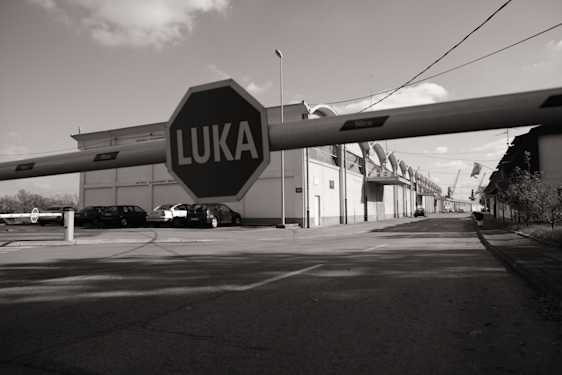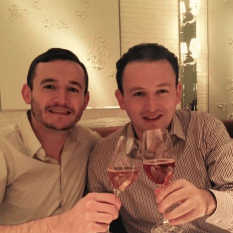
Luka - cleansing the territory of ‘undesirables’
Hodophiles is pleased to present an extract from the chapter 'Just in time' of Ian Bancroft’s new novel, Luka, which tells of lives scarred by wars past and present, whose main characters - L., U., K., and A. - are confronted with the dilemmas of truth and justice, and the struggle to reconcile and forgive. It is inspired by Bosnia and Herzegovina and the wars in the former Yugoslavia.
From tower block to tower block the soldiers went, forcing people from their apartments before they could collect even the most cursory of possessions. Some were dragged by the elbows, their arms tied in a sailor’s knot, whilst others were grasped from under their shoulders. They dug their heels into the floor, making a grating sound that spoke of their resistance. Neighbours struggled against one another to adhere to the megaphoned demands that they assemble outside immediately. The second war, the Re-Patriotic War, was only in its infancy, but the leaders of New Town were already moving to cleanse their territory of undesirables.
Some hid under their beds or in their wardrobes, trusting that the commotion would mask their rattling teeth, hasty breath, and helpless sobbing. Others were too scared to hide. Sniffer dogs went from room to room, scenting fear as much as body odour, forcing their handlers to restrain their exhilaration through a sharp tightening of the lead that caused the hounds to yelp. Their howls and growls indicated yet another hideaway. A young man slotted himself neatly beneath the floorboards, holding his breath like a deep-water diver, as the soldiers' boots stomped above. Dislodged dust tickled his cheeks and mixed with the tears seeping down his face. The loyalty of man’s best friend, oblivious to evil intent and rewarded with tasty morsels, jettisoned his prospects for escape.
As the muffled sounds became crisper, K. cried to A., now in her late twenties, that they must leave immediately. ‘Wrap up warm and hurry! Stay close to me! We mustn’t get split up!’ she instructed with the clarity of a football manager conveying tactics to their team. Though they had feared such a moment, they were still wholly unprepared. A. grabbed her coat, scarf and hat and made for the hallway. Armed men were going floor to floor, banging on doors and startling residents into action. People ran in panic down the stairs, keeping their heads low as they went, trying to slow their descent by leaning or pushing on the person in front of them. An elderly woman slipped and fell, to be partly caught by her son, who implored her to keep going. There was no pause for breath, even for those on the verge of fainting. K. looked down the spiral staircase, all four floors beneath, and watched her neighbours move in ant-like unison, sucked irresistibly towards the courtyard.
For A., the prospect of another war, the Re-Patriotic War, had bobbed around like the rubber duck in the bathtub where she spent hours reading; consumed by her contemplations and those of others either far away or from another era. Sometimes the waters subsumed and disoriented the helpless yellow object, only for it to resume its upright demeanour. That duck became a metaphor that she clung onto, hoping that no matter how turbulent the waters, they would continue to float along serenely.
K. was more pessimistic, her spirit tempered by past adversity. There were the tell-tale signs of renewed division. The rapport she had savoured since the last war, the Patriotic War, dispersed in denial. The familiar faces of New Town now shifted their gaze to the pavement when previously they would gawp in her direction. Some crossed the street to avoid potential encounters. There were no more enquiries about her health or family, only muffled ‘good mornings’ out of habit or embarrassment, or a more profound sense of humanity not yet compromised. These were the early symptoms of an illness that others would only later diagnose. And as with most pandemics, they will claim that it was beyond their control, that it could not have been prevented or contained, that it chose its victims randomly and festered upon the weakest.
Each viable escape route was blocked. Those who sought sanctuary on the roof, basking in the momentary relief of the swirling winds, were flung unceremoniously to their deaths. Punishment was swiftly meted out to those who had stayed behind, even those too frail or frightened to move. An elderly man received a fatal blow to the back of his skull with the butt of a rifle, blood seeping like lava into the corridor. A veteran of the Great War, his medals hung proudly on the wall, he died the most undignified death.
As they reached the courtyard, a woman with an unfamiliar face grabbed K. by the shoulder. ‘Take my keys,’ she implored, grasping K.'s hand and planting them firmly in her palm, closing her fingers over them, before giving a reassuring clench with both hands. She stared into her eyes briefly, yet with the power of eternity, forging an unbreakable contract that needed no signature. K. did not catch her name, only that she had lived in apartment number twenty.
They were lined up in pairs, young children huddled by their parent’s legs outside in the rasping cold. Anxious, fleeting glances left and right in search of reassurance were met with equally oblivious and disoriented eyes. Their personal identification documents were the only belongings they were told to take. Still, most clutched a few artefacts of sentimental value - photographs taken during better days stuffed into wallets, children’s teddy bears clutched under their arms – in which they could find solace. Anything of monetary worth, jewellery, watches, and the like, had been stashed away for safekeeping.
A man in military regalia, a rifle slung over his left shoulder, calmly established order whilst keeping a cigarette precariously balanced on the edge of his mouth; its ash lengthening at the same pace as the orderly queue before him. With its resplendent colour and delicate fabric, the burgundy red cap he sported softened his appearance. Clean-shaven and visibly well-rested, his words were a haven of reassurance, calming all those whose fate was now in their hands. ‘Don’t worry - you’ll be well looked after!’ he insisted with the reassuring voice of a priest.
Ian Bancroft is a writer based in the former Yugoslavia. ‘Luka’ can be purchased by clicking on the following
Ian is a writer based in the Balkans. He is the author of 'Dragon's Teeth - Tales from North Kosovo' and 'Luka'. Follow Ian on Twitter @bancroftian.
Currently in: Belgrade, Serbia — @bancroftian
